PRESENTATION
On the topic of: Organization of a role-playing game in the second junior group "Hospital"
Presentation prepared
educator MBDOU "Berry"
Shilets Tatyana Sergeevna
Noyabrsk, microdistrict Vyngapurovsky

- To form in children the ability to take on a role and perform appropriate game actions;
- To expand children's knowledge about the profession of a doctor: what does a doctor do, whom does he treat, how does he treat. Learn to take care of toys.
- To enrich children's understanding of the profession of a doctor.

Tasks:
- Encourage children to use knowledge about the surrounding life, about the hospital, more widely and creatively in the game.
- Develop creative imagination. Continue to acquaint not only with the profession of a doctor, but also with certain rules of conduct in the clinic, in the doctor's office, in the pharmacy.
Play equipment
- Doctor's coat and cap;
- Set "Doctor";
- Recipes;
- Medicines (boxes).

- Conversation with children about how they and their parents went to the hospital, pharmacy;
- Children's stories about what they learned about the profession of a doctor.

- Doctor - conducts an appointment, listens, looks at the throat, writes out a prescription.
- Nurse - helps to receive patients, fulfills the appointment of a doctor, makes injections.
- The patient - comes to the doctor's appointment, tells what worries him, follows the doctor's recommendations.

main stage "I play"
- Solving problems with children;
- To help create a game environment, to establish interaction between those who have chosen certain roles;
- To form in children the ability to play according to their own plan, to stimulate the creative activity of children in the game;
- To form friendly relations in the game, a sense of humanism, activity, responsibility, friendliness;

- The guys love to play the role-playing game "Hospital". In this game, they are also reflected in valeological education, since the children in the classroom project the knowledge gained into the game, enriching it with new situations and methods of treatment.
Organization: Kindergarten No. 80, Chelyabinsk
Location: Chelyabinsk
Program content
Target: formation in children of cognitive interest in the profession of a doctor (doctor), nurse, patient, interest in gaming activities, collective, productive, creative, cognitive research.
Tasks:
Educational
1. Form an idea of the integrity of the picture of the world and broaden one's horizons;
2. Enrich children's understanding of the medical profession;
3. Continue building self-care skills.
Developing:
1. To develop the attention and integrity of children's perception to enrich children's ideas about professions.
2. To form in children the ability to take on a playing role (doctor, patient).
3. Encourage children to act out the story of the familiar game "Hospital" using familiar medical instruments (toys).
4. Facilitate the emergence of a role-playing dialogue.
Educational:
1. To cultivate respect for the work of adults.
2. To form a caring attitude towards one's health, the ability to show sensitivity, care for a sick person.
Direction: personality-oriented.
Equipment: doctor costume, hospital play set, dolls.
Methods and techniques:
Excursion to the medical office;
Observations
Reading the fairy tale "Aibolit" by K. I. Chukovsky;
examination of medical gaming instruments;
educational conversations;
productive activity.
situational conversation,
speech situation,
Game (plot with rules)
Relevance: To the question: "Who is a doctor?, What is a hospital?" - children answer in monosyllables "it hurts." Toddlers still have practically no idea “What is work?” “What do they do at work?” Not to mention understanding the name of the specialty and job responsibilities. Therefore, it is very important to introduce children to the profession of a doctor, a nurse, to tell about the characteristic qualities that this or that profession requires, to expand the horizons of children about the work of adults, to apply the knowledge gained in role-playing games, life situations, which contributes to their connection with society.
Operating principles: integration of educational areas - socio-communicative, speech, motor, cognitive.
Practical significance: To strengthen family ties, hold a conversation with the child at home about the profession of a doctor, nurse, patient.
Planned results: have an idea about the profession of a nurse doctor and their parents, know the subjects of assistants, orient themselves in the social world. Show more independence in various activities. Know and understand the rules of conduct in public places.
Game progress:
Educator: Guys, do you know who your mom and dad work for?
Children's answers.
Tasia's mom works as a doctor! (the teacher explains that the doctor is also called a doctor).
Teacher: What does the doctor do?
Children's answers.
Today we will play the game "Hospital". Look, a doctor came to visit us today. Let's say hello to him together, for this we need to stand in a circle. (We all stand in a circle, the doctor takes turns calling the name of each child and says “Hello name”)
Doctor: Guys, do you know what the word "Hello" means?
"Hello" is when we wish each other good health.
Why do you think we need health?
Children's answers.
Doctor: What good fellows you are, we cannot do without health, we will get sick and will not be able to play, walk, communicate with friends.
How can you save your health?
Children's answers.
Doctor: Indeed, you need to eat healthy food, play sports, etc. And if a person does get sick, what should he do?
Children's answers.
Doctor: Of course, he needs to go to the hospital to see a doctor.
Educator:
If someone is not healthy
They call ... .. (doctors).
Wait, baby, don't cry!
He prescribed medicine ... (doctor).
Doctor: And let's spend a fun minute with you
The sun came out from behind the clouds
We will stretch our hands to the sun. (Sipping - hands up.)
Hands to the sides then
We'll spread it wider. (Sipping - arms to the sides.)
We've finished warming up.
Relaxed legs and back.
Educator: Who will we have today as a doctor? (they chose a boy) And what about the assistant to the doctor, the nurse? (they chose a girl) And the rest of the guys will be patients. Today we have a medical examination at the hospital.
The boys take their places. The doctor and nurse sit at the table, the patients on the chairs. The doctor sits on a chair.
Educator: Do not forget that the hospital should be quiet, do not make noise, do not interfere with the doctor treating sick children. The dialogue between the doctor and the patient is structured as follows:
D: Hello, what's your name?
B .: Hello, says his name.
D: What hurts you?
B: He says he's in pain.
The nurse takes notes and helps the doctor.
Next, the doctor proceeds to the examination. The patient thanks the doctor, says goodbye, leaves. The next patient comes in. The game continues. After 2-3 patients, it is proposed to change the role of the doctor. (The teacher helps and participates in the game).
Conclusion
Educator: Well done guys, they did an examination, everyone is healthy, the nurse prescribed vitamins! Did you like the game? What did we play today?
Children: to the hospital
Educator: Right!
Always attentive, with love
Our doctor is treating you guys.
When your health improves
He is the most happy.
The children were very active and took part in the game. After playing together with the teacher, the children play the game with dolls.
Literature:
1. Bozhovich L.I. "Personality and its formation in childhood". M.: Pedagogy, 2000
2. Vygotsky L.S. “The game and its role in the mental development of the child / / Questions of Psychology, 1961 - No. 2 - p. 62-76
3. Zvorygina E.V., The first plot games of kids. M: Enlightenment. 1988
4. Zvorygina E.V., Komarova N. “Pedagogical conditions for the formation of SURI / / preschool education. 1989 No. 5 p. 31-40
5. Elkonin D.V. The psychology of the game. 2nd edition. - M.: VLADOS, 1999
Abstract of the role-playing game in the preschool educational institution "Hospital" "At the appointment with a pediatrician"
Material Description:
I offer you a summary of the role-playing game "Hospital" for group children (4-6 years old).
This material will be useful to teachers working in kindergarten.
Preschoolers are very fond of role-playing games. In them, the guys gain an inner sense of freedom, since the action takes place in an imaginary situation, everything happens “for fun”. Thanks to this, the imagination, figurative thinking of the child actively develops. However, the game fulfills its developmental function only when it becomes more complicated as the child grows up. To form in children the ability to play the role-playing game "Hospital". To form the ability to consistently perform two consecutive actions of the plot (listens to patients, prescribes treatment, gives an injection, puts a thermometer, etc.); 1. To develop in children the ability to independently develop the plot of the game "Hospital"; to promote the independent creation and implementation of gaming ideas;
2. Learn to perform game actions in accordance with the general game plan; develop the ability to take on a role.
3. To form the ability to accompany their actions with verbal designations.
4. To cultivate a sense of responsibility, friendliness, respect for the profession of a doctor.
Preliminary work:
Excursion to the medical office of the kindergarten, demonstration by the nurse of various medical instruments, explanation of their purpose, showing how to act with them. Consideration of illustrative material on the topic. A conversation about the profession of a doctor (Who is a doctor? What kind of doctor can be called a good one? How should a patient behave? Who can work as a doctor?) Reading fiction: "Aibolit", "Phone" by K.I. .I.Krylov, "My bear" Z.Alexandrov;
Equipment:
Children's white medical gowns, hats; home-made medical cards, leaflets for prescriptions, directions for injections and vaccinations, pills; items from the “Puppet Doctor” set (phonendoscope, tweezers, spatulas, syringes, bandages, etc.); empty bottles, medicine boxes, pieces of foam rubber, etc.
Game progress:
Doctors have been with us since birth. Riddles about doctors in an easy and accessible form will explain to children that doctors do not need to be afraid, because not only vaccinations and injections are associated with them, but also the only way to quickly recover during an illness.
- Educator: Guys, listen and guess riddles:
1.
Who is the most useful in the world,
cure any disease?
Who is always in a white coat
busy with the most important thing?
Who, as soon as you enter,
says: "Open your mouth
and say loudly - ah-ah-ah!
Doesn't your head hurt?
Who is caring and kind?
Well, of course, it is ... (doctor).
2.
Don't be afraid of the pediatrician
Don't worry, calm down
And of course don't cry
It's just a child ... (Doctor)
3.
He will tell everyone when they are sick,
When should the tablets be taken?
He's wearing a glass shirt.
And the mercury column is always inside ... (Thermometer)
4.
Medicine bottle liquid
We sting a little wounds.
Mom, dad and baby
Heals abrasions ... (Zelenka)
5.
What's the name, my friend?
Any healing powder
Compressed into a cake?
They even treat a cat. …(Tablet)
6.
The children are so afraid of him
He is the greatest enemy in the world.
How does the bite feel?
They immediately run away
Or they will sob out loud ... (Syringe, injection)
Fizminutka: Parts of the body - a person.
Having built the children in a circle, we organize the game "Chain". Each player says a line and accompanies the show.
And so on in a circle, gradually increasing the pace of the game.
There are nails on our fingers,
Elbows on the hands.
Crown, neck, shoulders, chest
And don't forget your belly.
Hips, heels, two feet,
Shin and ankle.
Got knees and back
But she is only one.
We have on our heads
Two ears and two lobes.
Eyebrows, cheekbones, and whiskey
And eyes that are so close.
Cheeks, nose and two nostrils,
Lips, teeth - look!
Chin under the lip.
Here's what we know!
Educator: Before we start our game, we need to distribute the roles. Which one of you wants to be a doctor? Nurse, nurse? The doctor will be the most responsible of you. We have a real hospital with you.
- Educator: I will take on the role of chief physician and will help you.
- Here we have distributed the roles, now choose the attributes you need and start the game.
Choice of roles. The children take their places.
Reception begins.

Doctor (child):
- Hello, come in, sit down. Tell me what happened?
Patient (child):
- I have a stomach ache.


Doctor (child):
- Let's see, listen to the patient with a phonendoscope: "Breathe, do not breathe" (the doctor examines the patient). Go to the nurse, take pain pills (pills are substitute items). Get well soon, goodbye.
Patient (child):
-Hello!
Doctor (child):
- Hello, tell me, girl, what happened to you?

Patient (child):

- My throat hurts.
Doctor (child):
- Go to the nurse, she will give you a thermometer, and you will measure the temperature. No temperature. Let's see the throat, oh-oh! Throat red. To cure your throat, go to the nurse, and she will sprinkle you with tincture of calendula in the neck (sprays with a round stick).
The teacher leads the game encouraging interaction.
The game continues until the last child patient.
NATALIA VOLODINA
Presentation for the role-playing game "Polyclinic"
GBOU "School №2009" SP12 compensatory group for children with mental retardation
From the experience of the educator of a compensatory group for children with mental retardation Volodina Natalia Ivanovna.
This material is intended for educators of specialized groups for teaching children with mental retardation role-playing games.
Training takes place gradually, daily, both in class and in free time; different forms of education and methods are used, ranging from conversations with children, reading and looking at illustrations, preparing a subject-developing environment, equipment; introduction to attributes plot role-playing games and their purpose, etc.
In the process of studying game a large role belongs to the educator, who at the initial stage of training takes part in game, then helps with advice, actions to develop game plot, monitors the relationship of children. At the same time, correctional tasks for the development of speech and the enrichment of the dictionary are being solved.
Related publications:
In modern concepts of preschool education, it is noted that the preschooler feels the need to establish positive relationships.
 Project in the second junior group on the plot-role-playing game "Doctor" Worked on the project by: Sezneva NS Project type: short-term, game.
Project in the second junior group on the plot-role-playing game "Doctor" Worked on the project by: Sezneva NS Project type: short-term, game.
 Purpose: To work on the formation of gaming skills, while reflecting the work of adults. Tasks: 1. To give elementary knowledge about work.
Purpose: To work on the formation of gaming skills, while reflecting the work of adults. Tasks: 1. To give elementary knowledge about work.
In the role-playing game, the personality of the child, his intellect, will, imagination and sociability successfully develop. The kids in our group love it.
Good day, dear colleagues! In the last publication, you saw the attributes for a role-playing game, these were food.
Features of the organization of classes on the role-playing game Among the variety of children's games, role-playing games occupy a special place, they are the first social practice of the child, in a way.
Plan - summary of the plot - role-playing game. Theme: "Pharmacy" Plan - summary of the plot - role-playing game Age targeting: senior group Topic: "Pharmacy" Purpose: to expand ideas about professions.
REGULATIONS ON THE COMPETITION "IN THE WORLD OF ROLE-STORY GAME" (production of attributes for a role-playing game) 1. GENERAL PROVISIONS 1.1. Creation of conditions.
Alevtina Yalpayeva
Presentation "Labor education in the role-playing game "Hospital" in the first junior group"
At preschool age plot- role-playing is the main type of independent activity of the child, is crucial for the physical, moral and labor education for understanding the world around.
As is known, in game there is no direct dependence of the child on the adult and he receives more independence than in educational and labor activity. However, forms of play activity are acquired by children under the guidance of adults, and this process begins very early. Watching game activities the first days are noticeable that everyone plays with their own toy, the guys do not unite to play together, and some of them did not play at all, but only watched. Often there were conflicts over toys: many wanted, for example, to play with a fluffy cat, a small dump truck, which were not enough. Initially I myself take an active part in the games - I tell the guys how to build plot, distribute roles, pick up a toy, leading them to an independent organization of the game.
Joint play delivers to children great pleasure, this is where they appear first shoots of friendship, common experiences begin. Gradually I teach children to build on their own plot games and implement it using the knowledge gained from observing the surrounding life, listening to fairy tales, nursery rhymes, stories. Observations built so that the focus was on the person carrying out labor activity, for example, watched with children the work of a driver, a nanny, doctor: they paid attention to the fact that the driver works on the car and brings us food, the nanny cleans up group and sets the tables, is washing dishes. Such observations helped to switch the children from role play activities related to the subject to play activities associated with the role. However, one acquaintance was not enough for the emergence of the game.
Stop at shaping plot the most loved game in « hospital» . First what I did was to introduce them to the book by K. Chukovsky "Aibolit", drew attention to the cover, which depicts a doctor in a white coat, examined illustrations of how Aibolit treats little animals. All children showed big interest in the content of the book, carried away by colorful illustrations.
We looked at pictures with the image of a doctor with the children ....
We collectively visited the medical office in the kindergarten, looked at the scales, the stadiometer, the cabinet where medicines, bandages, cotton wool, etc. are stored. On another occasion, the children directly observed the work of the honey. sisters. She explained to the children that the doctor takes care of their health, makes vaccinations so that no one gets sick. Then a dressing gown with a hat, a doctor's bag with a thermometer and a phonendoscope appeared in the playroom. She introduced the children to these attributes, explained their meaning to the children, showed them how to act, gave the children themselves to try to listen to dolls, bears, put a thermometer, another time went directly to game.
All children came to the reception with their favorite toys, even those who had not previously taken part in game. In the future, the game introduced new medical attributes: syringe, jars. Gradually complicated plot. Having become interested, the children were more actively involved in the game. And when they got more knowledge about the profession and some experience we had a game in « hospital» .
To maintain interest in game, to complicate its content, I planned to introduce another role of a nurse, but first I told the children that a nurse is first assistant doctor: doctor examines sick and making appointments, the nurse performs them. The role of the nurse was assigned to the most active guys, the game became more lively. directing the games, I paid the greatest attention to the education of friendship in children, courtesy, the ability to reckon with the team, at the right moment was included in the game.
big what matters here is the content of the game, during which brought up proper attitude to the phenomena of the environment life: love to labor respectful attitude towards people labor. Given that the content of the game has big attention to the formation of the personality of the child, I develop an interest in games such as « Hospital» , "Score" in which kindness, care and politeness are formed.
plot- role playing games great educational opportunities in children desires skills work. "Diana", your doll’s bed is not made, carefully tuck in the blanket, ”I say, and the girl willingly gets to work, learning to game perform elementary labor activities.
Thoughtful environment, interesting toys, friendly society of comrades - all this makes you play with pleasure, in a good mood. Watching the progress of the game, I followed the speech of the children, imperceptibly intervened, correcting it, and they perceived it was like a completely natural phenomenon, they learned the correct expression.
It is necessary not only to teach children to play, but also to give them knowledge through the game, bring up they have moral qualities. During the game, I tried to always come to them help: choose the right toys, a place to play, assign roles. As a result of the work done, the game has become an integral part of the life and activities of children, they have such qualities as activity, self-confidence, the ability to unite in small groups and most importantly - to be friends.

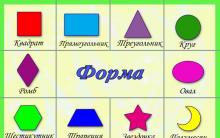
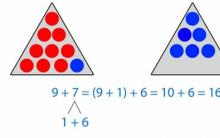
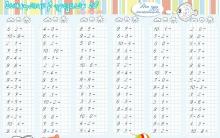
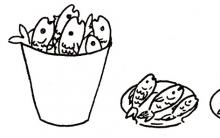

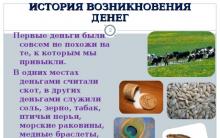




Map second language of geography
Literary games in elementary school Games for children in the library elementary school
Presentation "role-playing games in dow"
The green color on the physical map shows what the colors on the physical map represent
Intellectual game "through the pages of history"